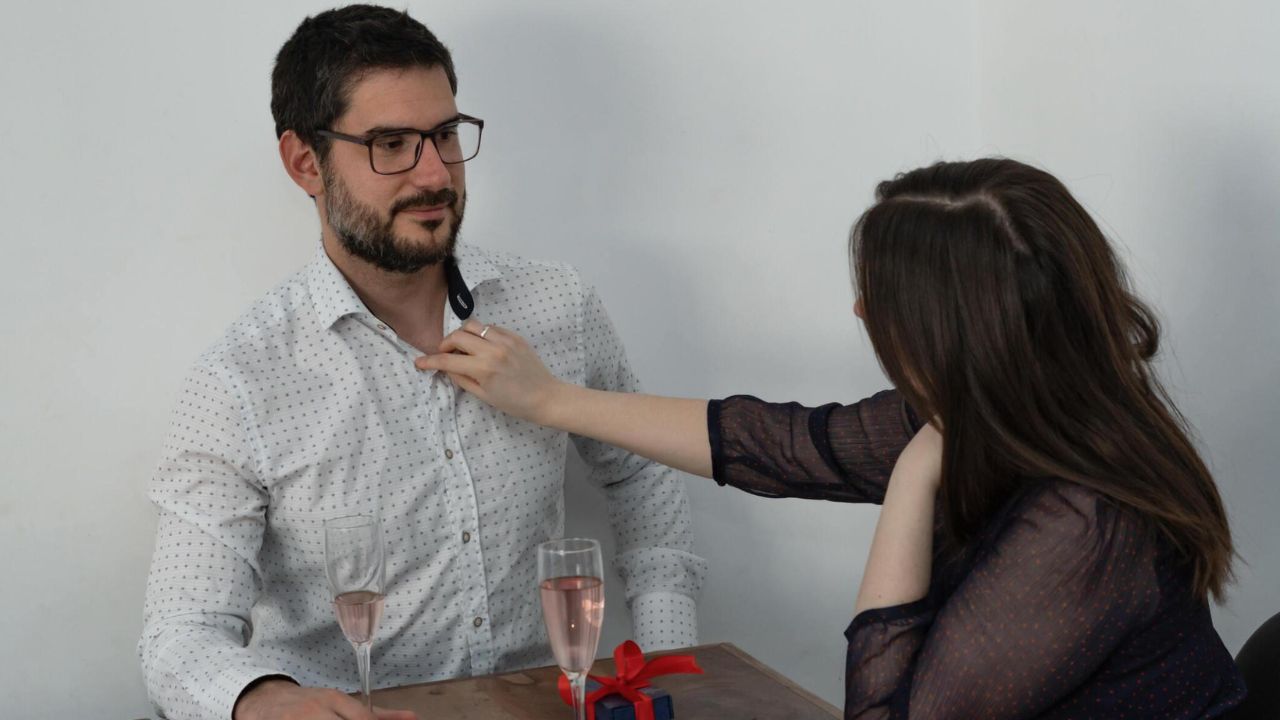Dating a widower comes with unique challenges. Many women find themselves feeling second best to a lost love. Our blog will share insights and stories that can help you understand these trials and decide if this path is right for you.
Dive in for honest reflections on love after loss.
Personal Experience Dating a Widower
I dated a widower, and it felt like I was living in the shadow of his late wife. Every story had her name, and each space in his home held her memory. It was tough feeling second-best to someone who wasn’t there anymore.
He kept taking pictures of them everywhere, making me feel like an outsider in my own relationship.
His kids were polite but distant; they weren’t ready for their dad to date again. We tried to get closer, but the bond just wasn’t forming. Holidays were the hardest part—seeing her place at the table empty while everyone else remembered past celebrations with her.
The grief that surrounded those occasions made intimacy difficult for us both.
The Challenges of Dating a Widower
Navigating a relationship with a widower comes with unique hurdles, often deeply rooted in the lingering presence of past love and loss. These challenges prompt careful treading through emotional landscapes marked by memories, grief, and complex family dynamics that can test the resilience of even the strongest connections.
Confronting the memory of his late wife
Seeing photos and personal items of a late wife in a widower’s home is tough. You feel like you’re living in the shadow of a deceased spouse. Sometimes he might even talk about her as if she were still there, or compare you two without meaning to.
These moments remind you that his heart still holds her close.
Dating a widower means stepping into an emotional space filled with grief and memories. You must find room for your own relationship to grow while respecting his past love. It’s not easy when signs of his late wife are all around, from stories shared by friends to the things he cherishes most.
Dealing with guilt and trauma
Dating a widower comes with unique challenges. Trauma from losing someone can linger. It takes time for them to heal, and sometimes they feel guilty for being happy without their late wife.
This guilt can make it tough to move forward in a new relationship. You might notice they pull away or stay quiet about their feelings.
Understanding their pain is key. Remember that loving again doesn’t mean they forget the past. They might struggle with emotional trauma and need space to grieve. Be patient and give them support during these hard times.
Offer kindness, but also take care of yourself if things get too heavy.
Handling his dating habits
His dating patterns might remind you of how he was with his late wife. He may choose the same kinds of places to take you or have set traditions on special dates that they celebrated together.
It’s tough, but try to understand that these habits come from a place of love for what he had.
It’s also possible he’ll pull away sometimes, especially on anniversaries and birthdays. Give him space during these times. Pushing him can make things harder for both of you. Know that it doesn’t mean he values you any less; grief just has a strong hold at times.
Insecurity and communication issues
Feeling second-best is tough in any relationship. For women dating a widower, this feeling can be strong. They often struggle with where they stand. The late wife’s shadow looms large, making them unsure and insecure.
Talking about these feelings can be hard if the widower isn’t open.
Sometimes, he might avoid tough talks about the past and future. This leaves his partner guessing what he truly feels. She needs honest chats to feel secure and understand his grieving process better.
If communication breaks down, trust can fade fast, hurting their chances of building a lasting bond together.
Navigating relationships with his children and in-laws
Getting close to his children and former in-laws can be tough. They might still hurt from their loss and see you as an outsider. You need patience and compassion to build trust with them.
Try making little steps, like joining family events or doing fun activities together.
Clear communication helps everyone understand each other better. Ask the widower for help when talking with his kids and past in-laws. This way, you can slowly become a part of the family circle without forcing it.
Your empathy towards their feelings makes a big difference too.
Dealing with pictures of the deceased spouse
Seeing pictures of his late wife around the house can be tough. It reminds you that you’re living in the shadow of a deceased wife. He might find comfort in these photos, but for you, it may feel like there’s little space for your own relationship to grow.
Nobody should compare you to her or ask you to walk in her shoes.
Talking about how these pictures affect you is important. Respectfully share your feelings and listen to his. Finding a balance is key; maybe keep some photos while creating room for new memories with you.
This isn’t just about removing items; it’s about respecting the past while making way for the future together.
Intimacy issues
Getting close to a widower can be hard. He might compare you to his late wife, making you feel like you’re in her shadow. This can hurt and create walls between the two of you. You want to share love and warmth but may end up feeling alone or second-best.
These struggles with intimacy stem from his past pain. Small things can remind him of what he lost, leaving him sad or distant suddenly. It’s tough for both of you to find comfort and trust when his heart is tied up in memories.
Your patience and understanding are important, but so is your need for a deep connection that doesn’t live in the past.
Red Flags When Dating a Widower
Navigating the complexities of a new relationship can be tricky, but when dating a widower, certain red flags may emerge that signal potential emotional turmoil ahead. Anyone entering this delicate dynamic must understand these signs to prevent being unprepared by unresolved issues from their partner’s past.
Lack of open communication
Open communication builds trust in any relationship. Dating a widower can test this trust if he’s not open about his feelings. Sometimes, they might hide their emotions to protect themselves or you.
This silence can make you feel like you’re guessing what’s on their mind.
It can be tough when a widower keeps memories to himself instead of sharing them with you. Without talking honestly, it feels hard to connect or understand where the relationship stands.
If he avoids discussions about the future, that’s another sign of poor communication. You might struggle to feel secure and valued in such silence.
The overbearing presence of the late wife’s memory
Living with a widower means often facing the late wife’s memory. His house may be full of her photos and personal things. It can feel like she is still there, watching over everything you do together.
This might make you feel like second best, always compared to someone who isn’t there anymore.
The presence becomes too much if he wants you to act or look like her. He might say you remind him of his late wife or ask you to wear something she wore. These signs show that he hasn’t moved on yet.
They can lead to hurt feelings and uncomfortable situations in your relationship.
Unresolved guilt about dating again
A widower might feel guilty about starting a new relationship. He could think that he’s betraying his late wife or not honoring her memory. Sometimes, friends and family add to this guilt by making him feel like it’s too soon to move on.
These feelings can hold him back from getting close to someone else.
Guilt can also make a widower pull away suddenly. One day things seem perfect, and the next day, he needs space. This push and pull is tough for the person dating him because it sends mixed signals.
It’s important for both people in the relationship to talk honestly about these feelings of guilt and find ways to deal with them together.
Ways to Address the Challenges
While dating a widower comes with its own unique set of challenges, there are strategies to help navigate this delicate relationship landscape. Embracing empathy and fostering an environment of open dialogue can pave the way for a meaningful connection that honors both the past and the future.
Understanding and patience
Dating a widower takes a special kind of understanding and patience. It’s about being empathetic towards what he has gone through. You need to know that his feelings for his late wife might still be strong.
This doesn’t mean he can’t love you; it just shows that grief is complicated and can coexist with new love. Be patient if he needs time to deal with his loss.
It helps to empathize with your partner as they navigate their bereavement journey. Recognize that sometimes the best support is simply being there, without pressure or judgment. Your steadiness can make all the difference in building trustworthiness and companionship within the relationship.
Open and honest communication
Open and honest communication is key in any relationship, but it’s especially crucial when you’re dating a widower. You need to talk clearly and listen well. Sharing your feelings helps build trust.
It’s important for the widower to openly share his thoughts about moving forward.
Expressing concerns and hopes makes things less confusing. If he introduces you to family and friends, that’s a good sign. Both sides must speak up about their needs and fears. This honesty creates a strong foundation for love and understanding.
Always ask questions if something is unclear. Make sure both of you know where the relationship stands. Open dialogue can prevent misunderstandings later on. It also shows respect for each other’s emotions during this delicate time.
Communication breaks down walls of insecurity or jealousy from the past. It allows room for new memories together without forgetting the old ones completely, fostering mutual contentment.
Building new memories together
Having fun with a widower and his kids can show he’s ready for new adventures. You might play games, cook meals, or go on trips. These activities help everyone bond and create happy moments.
Trust grows as you share experiences that are special to your relationship.
Making new memories does not mean forgetting the past. It means finding joy in the present and looking forward to future happiness together. A widower who wants fresh experiences will let you know.
He’ll be eager to explore life with you, proving he’s serious about love again.
Respect for his alone time
Respect his need for solitude. A widower navigates a storm of emotions, from loneliness to deep sadness. He might seek quiet moments to reflect on or honor the memory of his late spouse.
Give him space without feeling left out or second-best. It’s part of the healing process. When he pulls away, it doesn’t always signal problems between the two of you. Sometimes, it’s just his way of coping with loss.
Encourage him to share when he feels ready, but don’t push too hard. Alone time can be a powerful tool for anyone dealing with grief and bereavement, including widowers in new relationships.
Your support during these times shows understanding and builds trust—two key ingredients for a healthy relationship moving forward.
Asking important questions for clarity
Ask the widower if he feels ready for a new love. Ensure he isn’t just seeking a rebound relationship to cope with sorrow. Discussing how to honor the late wife without overshadowing your potential romance is crucial.
Learn about his emotional journey since being bereaved and what coping mechanisms he has in place. Find out how he deals with his family, especially when introducing someone new into their lives.
Discuss openly his desire to avoid feeling inferior or compared to his deceased spouse. Inquire whether he’s taken steps towards healing that show readiness for a committed, romantic relationship again.
Setting clear boundaries early on prevents misunderstandings and helps both partners know where they stand.
Why I Decided to Never Date a Widower Again?
I decided to never date a widower again after feeling like I was the second best. It hurt to always see pictures of his late wife around the house. He would share stories of their lives together, and it made me feel like an outsider.
We could not build something new because the past was always present.
My last relationship with a widower ended in heartbreak. He pulled away when things got serious, and I realized he had not moved on from his loss. Intimacy was hard for him because he felt guilty about loving someone else.
It became clear that we wanted different things from life, so I chose to move on for good.
Advice for Those Considering Dating a Widower
For those contemplating the unique journey of dating a widower, proceed with kindness and eyes wide open—you may discover profound connections as well as unexpected complexities.
Setting realistic expectations
Expect dating a widower to be different from other relationships. You’ll likely encounter emotions and situations that are new and challenging. It takes time for someone who has lost a spouse to heal.
Understand that they may not move forward as quickly as someone with no such loss might. You realize you can’t fill the gap left by his late wife, but you can create a unique place in his life.
Be ready for ups and downs as he deals with grief and memories that pop up unexpectedly. Trust-building plays a big role in forming a bond with a widower. Watch how he responds to certain reminders or dates; it will give you insight into his emotional state.
Stay patient and keep your expectations flexible while your relationship finds its own path.
Not trying to replace the late wife
You can’t take the late wife’s place. Widowers might look for someone like their previous partner. They may not even realize they’re doing it. Their choice might be based on similar looks, ways of acting, or shared hobbies.
But each person is unique, and trying to become a copy sets you up for trouble.
Respect the past, but build your own future together. Don’t feel bad if you do things differently from how his late wife did them. You have your own strengths and ways to add value to the relationship.
Keep in mind that real love means appreciating who you are now, not who someone else was before.
Awareness of potential red flags
Notice if a widower keeps his new relationship secret from friends or family. This could signal that he’s not ready to fully open up. A serious concern is when he won’t take down shrines to his late wife.
It may mean he can’t move forward yet. Watch for these signs carefully.
If talking about removing memories of the past ends with no action, it’s a red flag. The grieving process might be blocking a deeper connection with you. Be alert to these issues, as they can indicate bigger problems ahead in your relationship with the widower.
Conclusion
Dating a widower brought unique challenges into my life. I learned that dating someone who has lost a spouse comes with emotional hurdles. You might deal with their past love’s memories daily.
It can feel odd to see photos of his late wife everywhere. Guilt and trauma often show up too.
It gets complicated if the widower has children or in-laws. They may still be grieving, which has an impact on your relationship. Intimacy can also become an issue when you’re not on the same page emotionally.
There are red flags to watch out for in these relationships. If he won’t talk openly or keep your relationship secret, it’s a big concern. Another warning sign is if he constantly talks about his late wife.
If you decide to date a widower, patience and communication help a lot. Create new memories together without trying to replace anyone. Give him space when needed, and always ask questions to understand where he stands.
After my experiences, I’ve decided not to date widowers again. The mix of emotions just doesn’t work for me anymore.
For women considering dating a widower, go in with eyes wide open. Understand that there will be tough moments along with the good ones—set realistic expectations from the start.
Lastly, remember that every person is different—even widowers looking for love again.




















